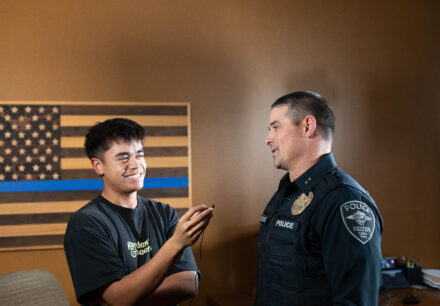The Gift of Disruption: Lessons from the Desert
It’s hard to believe that just a couple of months ago, I (Sheldon Nord) was sitting on a crowded flight to Indonesia, eagerly anticipating connecting with Corban alumni and friends. I was about to disembark and take public transportation to my lodgings. The next day, I would greet friends and dignitaries with handshakes and perhaps even hugs.
But by the time I boarded my flight home, these experiences would be turning to memories. Overnight, the world had changed.
And then I woke up the next morning, and it had changed again. Morning after morning, I woke up to shocking new announcements. Church services were being canceled. Weddings. Graduation.
Each new wave of change shook the core institutions of American life a little harder, and revealed that my sense of control was nothing more than an illusion.
Thousands of years ago, there was another people group who wondered what each new morning would bring, wondered whether they’d suddenly be asked to pack up and move, or stay still and wait.
“Whenever the cloud lifted from above the Tent, the Israelites set out; whenever the cloud settled, the Israelites encamped. . . . Whether the cloud stayed over the tabernacle for two days or a month or a year, the Israelites would remain in camp and not set out; but when it lifted, they would set out. At the Lord’s command they encamped, and at the Lord’s command they set out. They obeyed the Lord’s order, in accordance with his command through Moses.” (Numbers 9:17, 22-23)
Each night as the Israelites went to sleep, they had no idea if the following day would be filled with rest or toil; staying in place or packing up. For the first time in my life, as I woke up each morning to check the latest executive order, the latest guidelines for “social distancing,” the latest death toll, I could finally understand a hint of what the Israelites must have felt.
But this uncertainty—this lack of knowing the future—was not described as misery, punishment, or torture. It was a gift given by God to ignite faith and obedience. Day after day, the Israelites trusted and obeyed God’s commands. And day after day, God provided for their every need.
Water came out of the rock. The sky rained down quail. Each morning the Israelites found enough manna to feed themselves and their families for the day.
(I find it interesting that some of the Israelites tried to hoard manna, gathering more than they needed and storing it in their tents. Scripture tells us that didn’t go well.)
As I read through these stories of the Israelites’ wavering obedience and God’s unwavering faithfulness, I’m reminded of three key truths I’d like to share with you:
- Disruption in our lives is not new. God has been disrupting our lives since time began. Our experiences of disruption are uncomfortable and even painful, but they’re not surprising to God, and they teach us to trust Him.
- God wants our obedience more than our plans. True obedience comes not from knowing the future, but from saying “yes” to the next step God asks us to take.
- God always provides. You may find this statement cliché—until you see the water pour forth from the rock. Perhaps you get a bigger tax refund than you expected. Or your house sells quickly. Or God fills you with peace that no circumstances can explain. But when you trust in Him, God never fails to provide.
There’s nothing so comforting as remembering that we are not alone, and that God is in control. In this season of change that feels so unprecedented and strange, I pray you would turn to Scripture, remember the works of the Lord, and grow in faithful obedience.
To Christ be all Glory.
Sheldon C. Nord, Ph.D.
President







